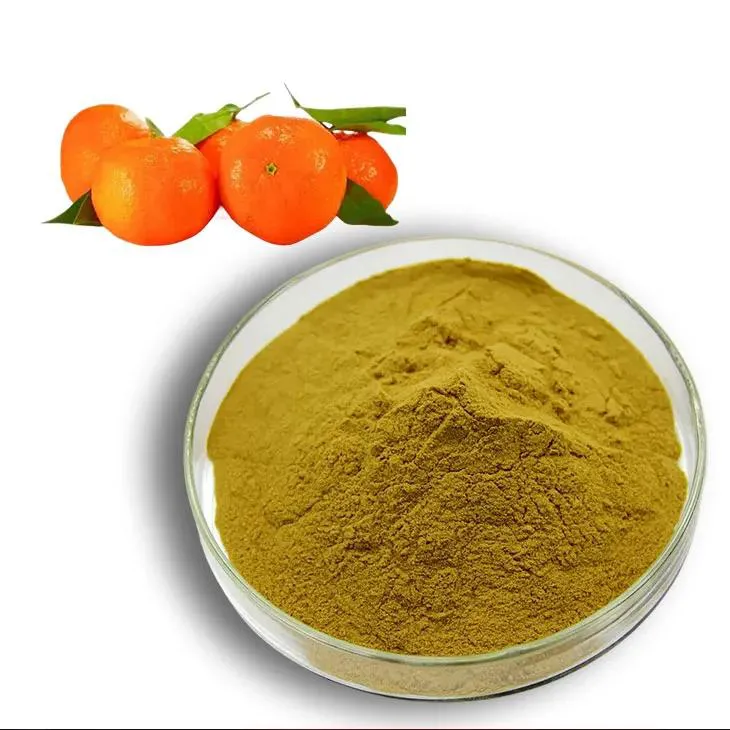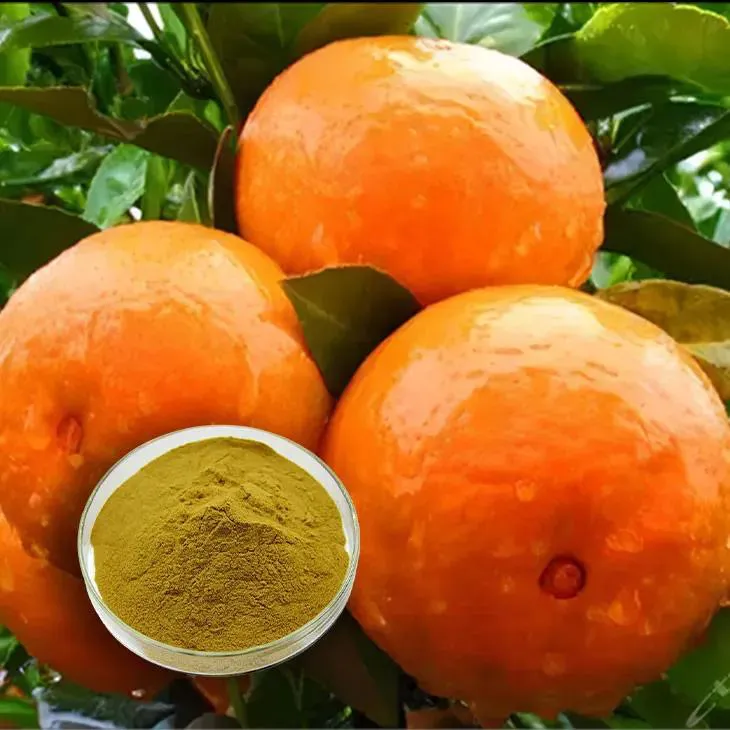- 0086-571-85302990
- sales@greenskybio.com
Active Components of Citrus Bioflavonoids
2024-11-27

1. Introduction to Citrus bioflavonoids
Citrus bioflavonoids are a fascinating group of compounds that are naturally occurring in citrus fruits. These fruits, such as oranges, lemons, and grapefruits, are not only delicious but also rich sources of bioflavonoids. The presence of these bioflavonoids gives citrus fruits an added dimension of health - promoting properties. They have been the subject of extensive research in recent years due to their wide - ranging effects on human health.

2. Antioxidant Properties
Antioxidants play a crucial role in maintaining the body's health. Citrus bioflavonoids are well - recognized for their antioxidant capabilities.
2.1. Free Radicals and Oxidative Stress
In the body, normal metabolic processes generate free radicals, which are highly reactive molecules. When there is an imbalance between the production of free radicals and the body's ability to neutralize them, oxidative stress occurs. Oxidative stress is associated with a variety of health problems, including cell damage, aging, and the development of chronic diseases.
2.2. Role of Hesperidin
Hesperidin, a common citrus bioflavonoid, is a potent antioxidant. It has the ability to scavenge reactive oxygen species (ROS). ROS are a type of free radical that can cause significant damage to cells. By neutralizing ROS, Hesperidin helps to reduce oxidative stress. This, in turn, may play a preventive role in diseases related to oxidative damage. For example, in the context of cardiovascular diseases, oxidative stress can damage blood vessels and contribute to the development of atherosclerosis. Hesperidin's antioxidant action may help to protect the cardiovascular system by preventing such damage.

3. Anti - Inflammatory Activities
Another important aspect of citrus bioflavonoids is their anti - inflammatory activities. Inflammation is a natural response of the body to injury or infection, but chronic inflammation can lead to various health problems.
3.1. Inflammatory Response Pathways
The body has complex inflammatory response pathways that are regulated by a variety of factors. When these pathways are dysregulated, excessive inflammation can occur. Citrus bioflavonoids can interact with these pathways to modulate the inflammatory response.
3.2. Naringenin's Anti - Inflammatory Effects
Naringenin, another bioflavonoid present in citrus fruits, has been shown to have significant anti - inflammatory properties. It can inhibit the production of inflammatory mediators. Inflammatory mediators are substances that are released during the inflammatory process and can cause further inflammation and tissue damage. By inhibiting their production, naringenin helps to alleviate inflammation - related symptoms. This could be beneficial in conditions such as arthritis, where chronic inflammation is a major factor contributing to pain and joint damage.

4. Anti - Microbial Properties
Citrus bioflavonoids also possess anti - microbial properties, which make them potentially useful in the fight against pathogens.
4.1. Types of Pathogens
Pathogens can include bacteria, viruses, and fungi. These microorganisms can cause a wide range of infections in the body, from minor skin infections to more serious systemic infections.
4.2. Mechanisms of Anti - Microbial Action
The exact mechanisms by which citrus bioflavonoids exert their anti - microbial effects are still being investigated. However, it is believed that they can interfere with the growth and survival of pathogens in several ways. For example, they may disrupt the cell membranes of bacteria or interfere with the replication of viruses. This ability to combat pathogens adds another dimension to the health - promoting properties of citrus bioflavonoids.
5. Role in Nutrition
In the field of nutrition, citrus bioflavonoids play an important role, especially in relation to vitamin C.
5.1. Vitamin C Absorption
Citrus bioflavonoids can enhance the absorption of vitamin C. Vitamin C is an essential nutrient that is involved in many important functions in the body, such as collagen synthesis, immune function, and antioxidant defense. By improving its absorption, citrus bioflavonoids contribute to the overall effectiveness of vitamin C in the body. This synergy between citrus bioflavonoids and vitamin C further enhances the health benefits associated with consuming citrus fruits.
5.2. Overall Health Benefits
The combined effects of the antioxidant, anti - inflammatory, anti - microbial properties of citrus bioflavonoids, along with their role in enhancing vitamin C absorption, result in a wide range of overall health benefits. These can include improved cardiovascular health, reduced risk of chronic diseases, enhanced immune function, and better skin health. For example, the antioxidant and anti - inflammatory properties may help to keep the skin looking youthful and healthy by protecting against damage from free radicals and reducing inflammation in the skin.
6. Conclusion
In conclusion, citrus bioflavonoids are a group of highly active components with diverse and significant properties. Their antioxidant, anti - inflammatory, anti - microbial activities, as well as their role in nutrition, make them important for maintaining good health. Further research is still needed to fully understand the mechanisms underlying their actions and to explore their potential applications in medicine and nutrition. However, the existing evidence strongly suggests that including citrus fruits in the diet, which are rich sources of bioflavonoids, can be a simple and effective way to promote overall health and well - being.
FAQ:
What are the main antioxidant citrus bioflavonoids?
Hesperidin is one of the main antioxidant citrus bioflavonoids. It can scavenge reactive oxygen species, reducing oxidative stress in the body. This helps in preventing diseases associated with oxidative damage, such as cardiovascular diseases.
How do citrus bioflavonoids exhibit anti - inflammatory activities?
Citrus bioflavonoids exhibit anti - inflammatory activities by modulating the body's inflammatory response pathways. For example, naringenin has been shown to inhibit the production of inflammatory mediators, thereby alleviating inflammation - related symptoms.
Can citrus bioflavonoids fight against pathogens?
Yes, some citrus bioflavonoids have anti - microbial properties, which can be beneficial in fighting against certain pathogens.
Why are citrus bioflavonoids important in nutrition?
Citrus bioflavonoids are important in nutrition as they can enhance the absorption of vitamin C. This further contributes to overall health benefits.
What are the potential health benefits of citrus bioflavonoids?
The potential health benefits of citrus bioflavonoids include antioxidant effects (preventing diseases related to oxidative damage), anti - inflammatory activities (alleviating inflammation - related symptoms), anti - microbial properties (fighting against pathogens), and enhancing vitamin C absorption in nutrition for overall health benefits.
Related literature
- Citrus Bioflavonoids: Chemistry, Biological Activity, and Clinical Significance"
- "The Role of Citrus Bioflavonoids in Health and Disease"
- ▶ Hesperidin
- ▶ citrus bioflavonoids
- ▶ plant extract
- ▶ lycopene
- ▶ Diosmin
- ▶ Grape seed extract
- ▶ Sea buckthorn Juice Powder
- ▶ Beetroot powder
- ▶ Hops Extract
- ▶ Artichoke Extract
- ▶ Reishi mushroom extract
- ▶ Astaxanthin
- ▶ Green Tea Extract
- ▶ Curcumin Extract
- ▶ Horse Chestnut Extract
- ▶ Other Problems
- ▶ Boswellia Serrata Extract
- ▶ Resveratrol Extract
- ▶ Marigold Extract
- ▶ Grape Leaf Extract
- ▶ blog3
- ▶ Aminolevulinic acid
- ▶ Cranberry Extract
- ▶ Red Yeast Rice
- ▶ Red Wine Extract
-
Grape Seed Extract
2024-11-27
-
Red Date Extract
2024-11-27
-
Phellodendron Extract
2024-11-27
-
Aminolevulinic acid
2024-11-27
-
Berberis aristata Extract
2024-11-27
-
Andrographis Paniculata Extract Powder
2024-11-27
-
Hawthorn powder
2024-11-27
-
Plantain extract
2024-11-27
-
Tinospora cordifolia extract
2024-11-27
-
Polygonum Cuspidatum Extract
2024-11-27





















